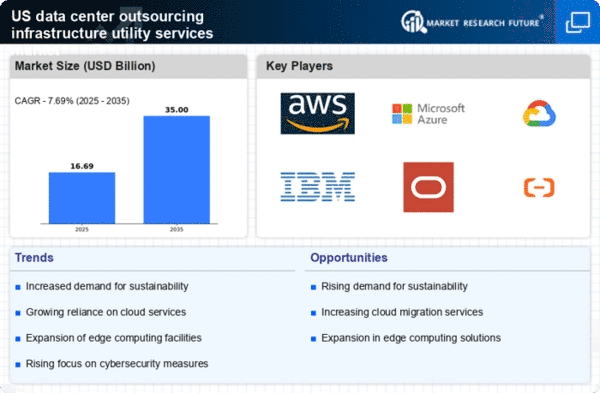Shift Towards Hybrid IT Environments
The shift towards hybrid IT environments is a defining trend in the data center-outsourcing-infrastructure-utility-services market. Organizations are increasingly adopting a combination of on-premises and cloud-based solutions to optimize their IT infrastructure. This hybrid approach allows for greater flexibility, enabling businesses to allocate resources based on specific needs. Recent data suggests that approximately 70% of enterprises are expected to implement hybrid IT strategies by 2026. As a result, service providers are likely to adapt their offerings to support this transition, which may lead to a substantial increase in market activity. The growing preference for hybrid solutions is poised to reshape the competitive dynamics within the data center-outsourcing-infrastructure-utility-services market.
Growing Demand for Scalable Solutions
The data center-outsourcing-infrastructure-utility-services market experiences a notable surge in demand for scalable solutions. As businesses increasingly seek to adapt to fluctuating workloads, the need for flexible infrastructure becomes paramount. This trend is particularly evident in sectors such as e-commerce and finance, where rapid growth necessitates the ability to scale resources efficiently. According to recent estimates, the market for scalable data center solutions is projected to grow at a CAGR of approximately 15% over the next five years. This growth is driven by the necessity for organizations to maintain operational agility while managing costs effectively. Consequently, service providers in the data center-outsourcing-infrastructure-utility-services market are likely to enhance their offerings to meet this evolving demand.
Regulatory Compliance and Data Sovereignty
Regulatory compliance remains a significant driver in the data center-outsourcing-infrastructure-utility-services market. With the increasing complexity of data protection laws, organizations are compelled to ensure that their data handling practices align with legal requirements. This is particularly relevant in industries such as healthcare and finance, where data sovereignty is critical. The market is witnessing a shift towards solutions that facilitate compliance with regulations like GDPR and HIPAA. As a result, service providers are enhancing their offerings to include compliance-focused features, which may lead to a projected increase in market value by 20% over the next few years. This focus on regulatory adherence is likely to shape the competitive landscape of the data center-outsourcing-infrastructure-utility-services market.
Technological Advancements in Data Management
Technological advancements play a crucial role in shaping the data center-outsourcing-infrastructure-utility-services market. Innovations in data management technologies, such as artificial intelligence and machine learning, are transforming how data is processed and analyzed. These technologies enable organizations to derive actionable insights from vast amounts of data, thereby enhancing decision-making processes. Furthermore, the integration of advanced analytics tools is expected to increase operational efficiency by up to 30% in the coming years. As companies strive to leverage data for competitive advantage, the demand for sophisticated data management solutions within the data center-outsourcing-infrastructure-utility-services market is likely to escalate, prompting service providers to invest in cutting-edge technologies.
Rising Importance of Disaster Recovery Solutions
The rising importance of disaster recovery solutions significantly influences the data center-outsourcing-infrastructure-utility-services market. Organizations are increasingly recognizing the need for robust disaster recovery plans to mitigate risks associated with data loss and downtime. This trend is particularly pronounced in sectors reliant on continuous operations, such as telecommunications and finance. Recent surveys indicate that nearly 60% of businesses prioritize disaster recovery capabilities when selecting service providers. Consequently, the demand for comprehensive disaster recovery solutions is expected to grow, potentially increasing market revenues by 25% over the next five years. This emphasis on resilience and continuity is likely to drive innovation within the data center-outsourcing-infrastructure-utility-services market.
















